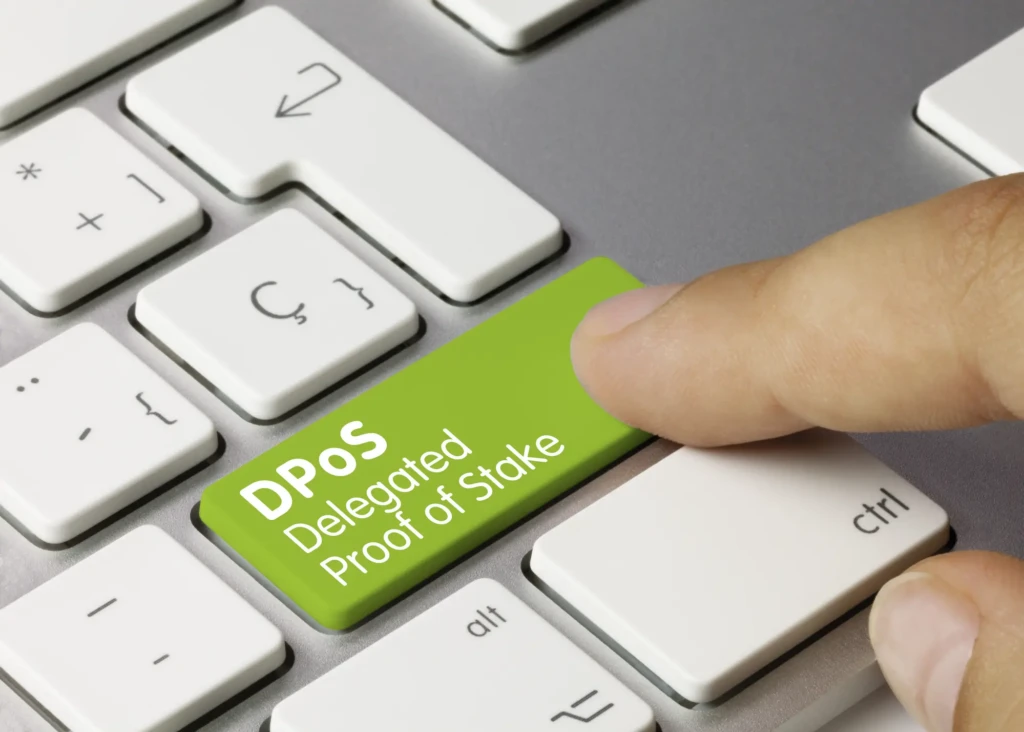What Is Delegated Proof of Stake (DPoS)?
Delegated Proof of Stake (DPoS) is a blockchain consensus mechanism designed to improve upon traditional Proof of Stake (PoS) by introducing a more democratic and efficient system for validating transactions. First proposed by Daniel Larimer in 2014, DPoS aims to address scalability and decentralization challenges inherent in earlier consensus models.
How DPoS Works
Voting and Delegation
In a DPoS system, token holders participate in the governance of the blockchain by voting for delegates, often referred to as “witnesses” or “block producers.” These delegates are responsible for validating transactions and producing new blocks. The number of votes a user can cast is typically proportional to the amount of tokens they hold, ensuring that those with a larger stake have a greater influence on the network’s operations.
Block Production and Rewards
Once elected, delegates take turns producing blocks in a round-robin fashion. This scheduled block production enhances the efficiency of the network. Upon successfully validating a block, delegates receive transaction fees as rewards, which are then distributed among the users who voted for them, based on the proportion of their stake.
Advantages of DPoS
Scalability and Speed
By limiting the number of active validators to a select group of delegates, DPoS can process transactions more quickly than traditional PoS systems. This scalability makes it suitable for applications requiring high throughput.
Energy Efficiency
Unlike Proof of Work (PoW) systems, which require significant computational power, DPoS operates with minimal energy consumption. This efficiency contributes to a smaller environmental footprint.
Democratic Governance
The voting mechanism in DPoS allows token holders to have a say in the network’s governance, promoting a more democratic approach to decision-making. Delegates are incentivized to act in the best interests of the community to retain their positions.
Disadvantages of DPoS
Centralization Risks
The reliance on a limited number of delegates can lead to centralization, where a small group holds significant control over the network. This concentration of power may undermine the decentralized ethos of blockchain technology.
Voter Apathy
The effectiveness of DPoS depends on active participation from token holders. Low voter turnout can result in the election of delegates who may not represent the broader community’s interests.
Potential for Collusion
With a finite number of delegates, there is a possibility for collusion among them, which could compromise the integrity of the network. Ensuring transparency and accountability is crucial to mitigate this risk.
Real-World Applications of DPoS
Several prominent blockchain platforms have adopted DPoS to leverage its benefits:
- EOS: Utilizes DPoS to achieve high transaction throughput and scalability.
- TRON: Employs DPoS for efficient content sharing and decentralized applications.
- BitShares: One of the first implementations of DPoS, focusing on financial services.
- Steemit: A social media platform that uses DPoS to reward content creators.
These platforms demonstrate the practical applications and advantages of DPoS in various sectors.
DPoS vs. Other Consensus Mechanisms
| Feature | DPoS | PoS | PoW |
|---|---|---|---|
| Transaction Speed | High | Moderate | Low |
| Energy Consumption | Low | Low | High |
| Decentralization | Moderate | High | Low |
| Governance Model | Representative Voting | Direct Participation | None |
While DPoS offers enhanced scalability and energy efficiency, it may compromise on decentralization compared to PoS and PoW systems.
Frequently Asked Questions (FAQs)
What Is Delegated Proof of Stake (DPoS)?
DPoS is a blockchain consensus mechanism where token holders vote for delegates to validate transactions and produce blocks, aiming to enhance scalability and governance efficiency.
How Does DPoS Differ from Proof of Stake (PoS)?
Unlike PoS, where all token holders participate in validation, DPoS limits this role to elected delegates, streamlining the process and potentially increasing efficiency.
What Are the Main Benefits of DPoS?
The primary advantages of DPoS include higher transaction speeds, lower energy consumption, and a more democratic governance structure through token holder voting.
Are There Any Drawbacks to DPoS?
Yes, DPoS can lead to centralization of power, voter apathy, and potential collusion among delegates, which may undermine the network’s integrity.
Which Blockchain Platforms Use DPoS?
Platforms like EOS, TRON, BitShares, and Steemit have implemented DPoS to leverage its scalability and efficiency benefits.
Conclusion
Delegated Proof of Stake (DPoS) represents a significant evolution in blockchain consensus mechanisms, offering solutions to scalability and efficiency challenges. While it introduces a more democratic governance model, it also presents risks related to centralization and voter participation. As blockchain technology continues to evolve, the balance between efficiency and decentralization will remain a critical consideration for future implementations of DPoS.

